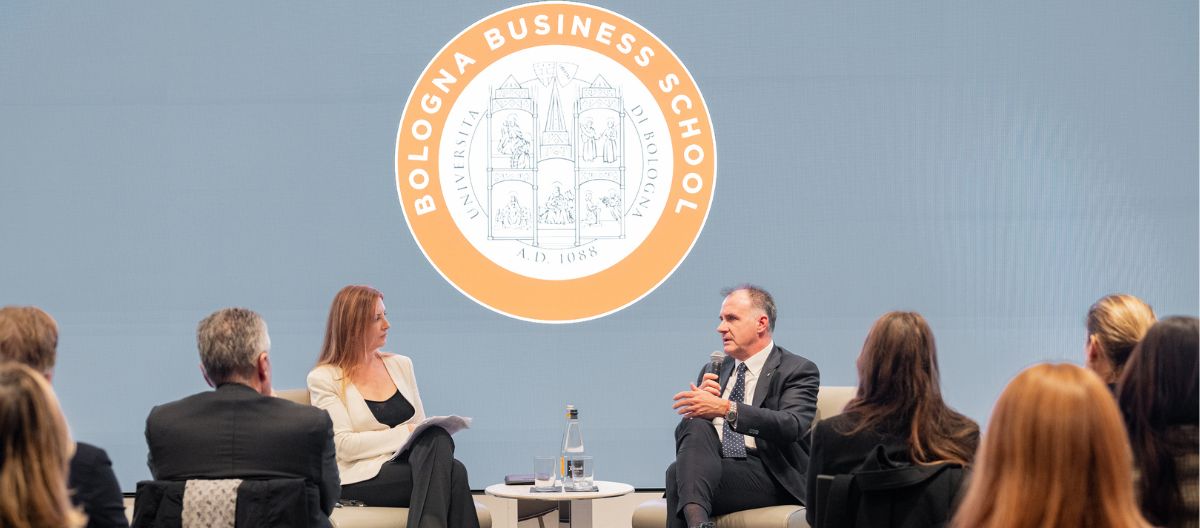
Competitiveness, energy and artificial intelligence: Emanuele Orsini opens the BBS Leadership Talks 25/26
26 November 2025At the new Bologna Business School Campus, the new season of the Leadership Talks opened with one of the most influential voices in Italian industry today: Emanuele Orsini, President of Confindustria, in conversation with Barbara Carfagna, journalist and RAI anchorwoman.
The welcome address was given by Dean Max Bergami, who recalled the strong bond between the School, the Confindustria system and the manufacturing fabric of the region. A relationship that has accompanied BBS since its origins and that finds in the new Campus and its international Community a natural evolution: a place where businesses, academia and young talents meet to reflect on the transformations of the real economy.
A country in need of an industrial plan
In his conversation with Barbara Carfagna, Orsini tackled the major issues on Italy’s economic agenda, starting from the budget law and industrial policy choices. While acknowledging the importance of keeping public finances under control, he insisted on one key point: Italy needs a medium-term industrial plan, capable of providing certainty for investments and continuity for measures in favour of enterprises.
Competitiveness, he stressed, is not only played out on GDP figures, but on the concrete ability of companies to plan, innovate and grow. Hence the focus on productivity policies, on the need for stable measures and on a regulatory framework that supports development instead of slowing it down.
There was also a reference to Southern Italy and the ZES model, presented as a virtuous example of how incentives and administrative simplification can generate investment, employment and new competitiveness across wide areas of the country.
Artificial intelligence: from a “referee” Europe to the need to innovate
A central part of the Talk was devoted to artificial intelligence, a topic that cuts across research, industry, education and regulatory responsibility.
Orsini described AI as a technology destined to become as pervasive as electricity, capable of transforming production processes, services and the organisation of work.
In the dialogue with Carfagna, a reflection emerged on Europe’s role: very attentive to regulatory aspects, less determined when it comes to supporting the emergence of major technological players. Faced with the massive investments of the United States and China, the risk is that of a continent that remains a “referee” while others actually play the game.
For Italian businesses, the challenge is not theoretical but concrete: moving from conferences on scenarios to real experimentation within companies, especially SMEs, integrating AI into production and management processes. In this context, skills development and dialogue with universities become strategic levers.
Energy and competitiveness: the cost that decides where to invest
The issue of energy touched on one of the most sensitive points for anyone doing business today. Orsini recalled how the cost of energy has now become a decisive factor in determining whether it is convenient to produce in one country rather than another.
The comparison with other European countries, particularly Spain and France, highlights significant differences that directly affect companies’ margins and investment choices. Hence the urgency for measures that make the Italian system more competitive: a balanced energy mix, greater integration of the European energy market and tools that allow households and firms to benefit from the investments already made in renewables.
In this perspective, energy is not just a technical issue, but a key element of industrial and strategic security.
Young people, wages and housing: dignity as a condition for growth
In the final part of the Talk, Dean Bergami brought the discussion back to the core mission of BBS: young people and their future. The conversation focused on three interconnected issues: wages, access to housing, and the country’s ability to retain and attract talent.
Orsini acknowledged the central importance of wages and stressed the value of dialogue with trade unions to find solutions that reward productivity, counter less protective contracts and strengthen welfare. At the same time, he pointed to access to housing at sustainable costs as a fundamental condition for building a life and career perspective for younger generations, especially in the most dynamic industrial areas.
In a demographic context marked by a gradual decline in the working-age population, the ability to create conditions for a dignified life and qualified work becomes one of the key factors for the country’s competitiveness.
A laboratory for dialogue between business, institutions and new leadership
The Leadership Talk with Emanuele Orsini offered the BBS Community a direct look at the challenges facing Italian industry: the need for an industrial plan, the energy transition, artificial intelligence, and the role of young people and human capital.
Through the exchange between the President of Confindustria, an anchorwoman who has long narrated technological and geopolitical transformations, and an audience of entrepreneurs, managers and students, the new Bologna Business School Campus once again proved to be a laboratory for dialogue between different yet deeply interconnected worlds.
